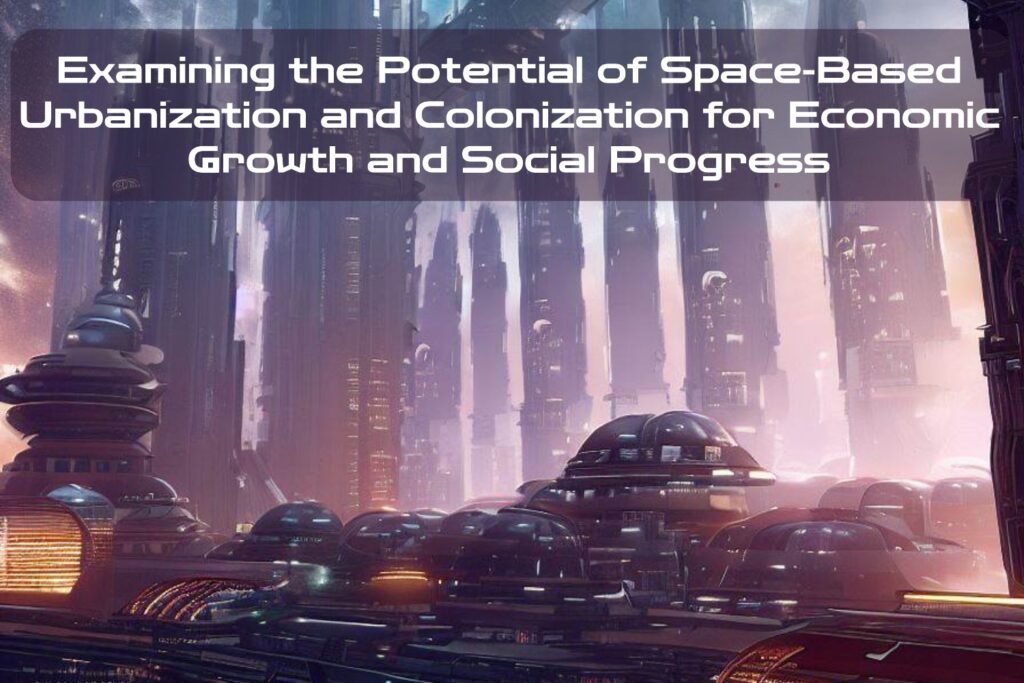The Future of Urbanization: Beyond Earth
Exploring the Potential Benefits of Space-based Urbanization and Colonization
As we look to the future, it is clear that urbanization will only continue to grow as our population increases. However, what if we could expand beyond our planet to create new habitats and cities in space? This is the concept of space-based urbanization and colonization, which holds immense potential for economic growth and social development.
The idea of space-based urbanization involves creating habitable structures or even entire cities outside of Earth’s atmosphere. These structures could be built on other planets or moons, or they could be located in orbit around the Earth or other celestial bodies.
While this may sound like science fiction, recent technological advancements have made it a feasible possibility. So why pursue such a seemingly difficult endeavor?

The potential benefits are numerous.
For one, space-based industries could drive economic growth.
Imagine asteroid mining operations that extract valuable minerals and resources from other planets and asteroids.
Or picture space tourism becoming a reality with people visiting hotels and resorts located in orbit around the Earth.
But it’s not all about profit – there are also various social benefits to consider when it comes to space-based urbanization. For example, overpopulation is a major challenge on Earth that could potentially be alleviated by expanding our living space into outer space.
Additionally, accessing resources such as water or minerals from other planets could help address resource scarcity concerns on our home planet. It’s clear that while still in the early stages of feasibility studies, research has shown that there are many possible benefits to pursuing space based development, which has the potential to drive economic growth while providing solutions for challenges faced both today and likely in the coming decades as populations continue to increase whilst resource scaricity issues increasely come into play.
The possibilities are truly limitless when we look beyond Earth for opportunities for growth and progress.
The Economic Benefits of Space-Based Urbanization and Colonization

Space-Based Industries: Asteroid Mining and Space Tourism
One of the primary economic benefits of space-based urbanization and colonization is the potential for space-based industries to drive economic growth. One such industry that has gained significant attention in recent years is asteroid mining. Asteroids contain valuable resources such as precious metals, water, and rare earth elements that are essential for modern technology.
The potential profitability of asteroid mining has led to numerous private companies investing in developing technologies to extract these resources. Another space-based industry that could drive economic growth is space tourism.
As technology advances, it becomes increasingly feasible for individuals to travel into space for leisure purposes. The rise of space tourism could open up new markets for services such as hotels, restaurants, and entertainment venues that cater specifically to tourists in space.
New Markets: Goods, Services, and Supply Chains
In addition to driving economic growth through specific industries such as asteroid mining and space tourism, the very act of creating colonies in outer space would create new markets for goods and services. For example, constructing a habitable environment in the vacuum of space would require specialized construction techniques and materials.
Maintenance services would also be required to keep these habitats functioning properly over time. New supply chains would need to be developed with a focus on efficiency due to the logistical difficulties presented by transportation through outer space.
Job Creation: A New Industry
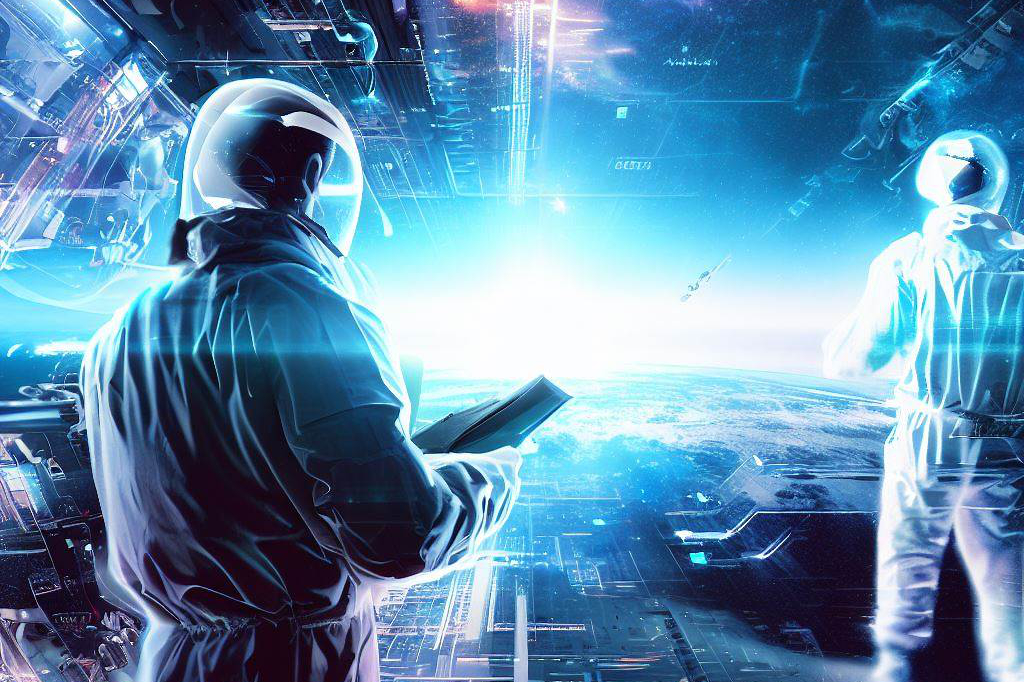
Another major benefit of developing a new industry around space-based urbanization is job creation. Many jobs related to maintaining and operating the habitats are necessary, including but not limited to engineers who design life support systems or even people who work on keeping agricultural systems up-to-date so colonizers can eat fresh food grown on-site rather than relying on food transported from Earth.
The development of a new industry related specifically to outer space could create millions of new jobs, which would have a positive effect on the overall economy.
The potential economic benefits of space-based urbanization and colonization are vast, and could lead to significant growth in industries, job creation, and market expansion.
The question now lies in whether humanity is ready to take on the challenges that arise with such a project.
Social Benefits of Space-Based Urbanization and Colonization

Alleviating overpopulation on Earth
The world’s population continues to grow at an alarming rate, and as a result, pressure on resources and the environment has also increased. Space-based urbanization provides a unique opportunity to alleviate overpopulation pressures by providing a new frontier for humanity.
By establishing settlements in space, we can reduce the strain on Earth’s resources while also opening up new opportunities for economic growth. One way space-based urbanization could help alleviate Earth’s population crisis is by providing an alternative destination for those who want to leave the planet.
Space habitats and colonies could provide living quarters for people who want to escape overcrowded cities or nations. With more people settling in space, less pressure would be exerted on the already limited resources of our planet.
Accessing resources from other planets or asteroids
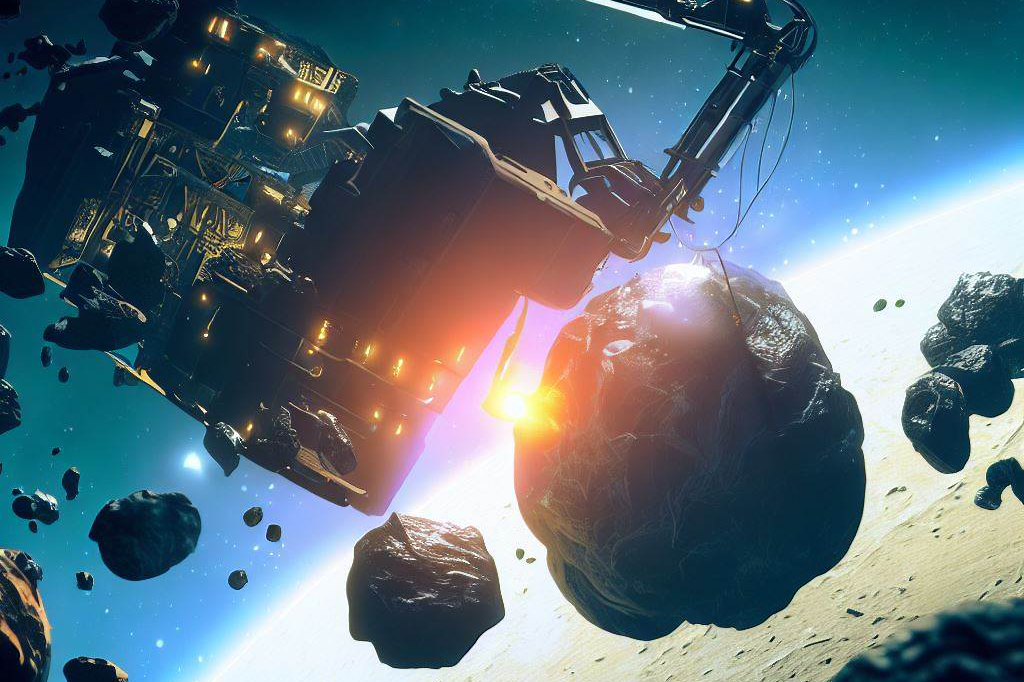
Resource scarcity is another looming issue that can be addressed through space-based urbanization. Our planet has limited natural resources that are rapidly depleting under the weight of population growth and industrialization. However, in space, there are vast deposits of minerals like platinum group metals (PGMs), rare earth elements (REEs), gold, silver, nickel, cobalt etc.
Space mining could provide us with access to these valuable minerals that could fuel technological innovation and economic growth back here on Earth. Asteroid mining could provide us with water, which is essential for life support systems both in orbit around Earth and on future missions deeper into the solar system.
Potential for scientific discovery and innovation
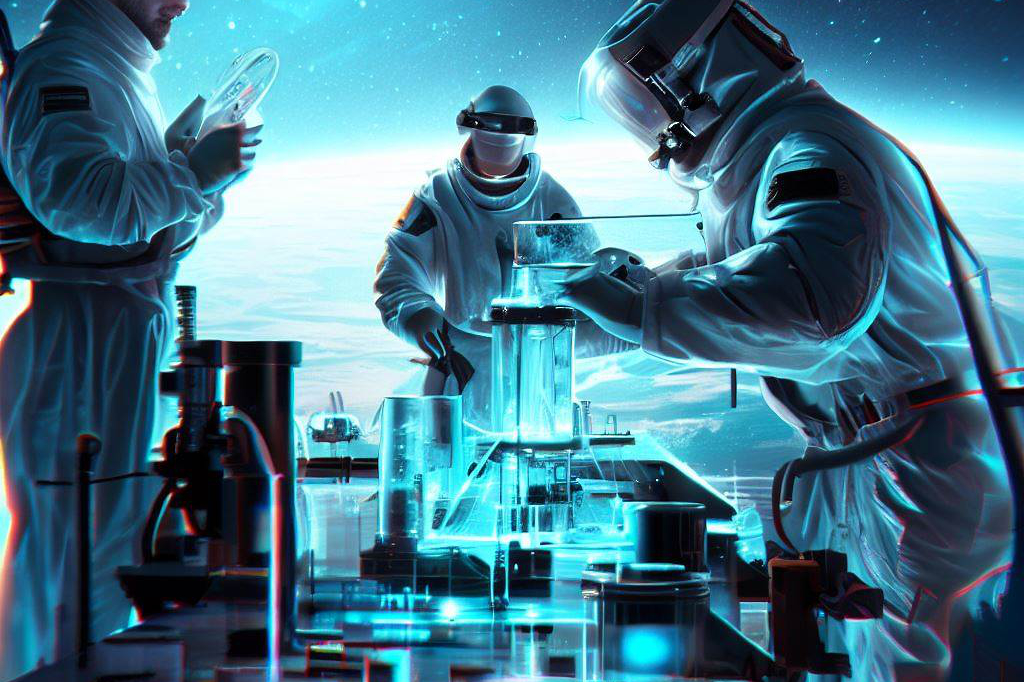
Space exploration has always been about pushing boundaries: reaching new heights (literally) while expanding our knowledge and understanding of ourselves and our universe. With space-based urbanization comes an immense opportunity for scientific discovery. From developing new medicines through microgravity research to exploring hydroponic farming in the controlled environment of space habitats, we could gain valuable insights that could help us improve life here on Earth.
Space-based urbanization can also help us tackle some of the world’s most pressing environmental challenges through innovations in waste management, energy production, and clean air technologies. Space-based urbanization and colonization offer many potential social benefits.
From reducing pressure on resources and alleviating overpopulation to unlocking the scientific potential for discovery and innovation, there is much to gain from expanding our horizons beyond Earth. With advancements in technology and a growing interest among private entities to explore space, it is exciting to think about what the future holds for humanity in space.
Challenges to Space-Based Urbanization and Colonization
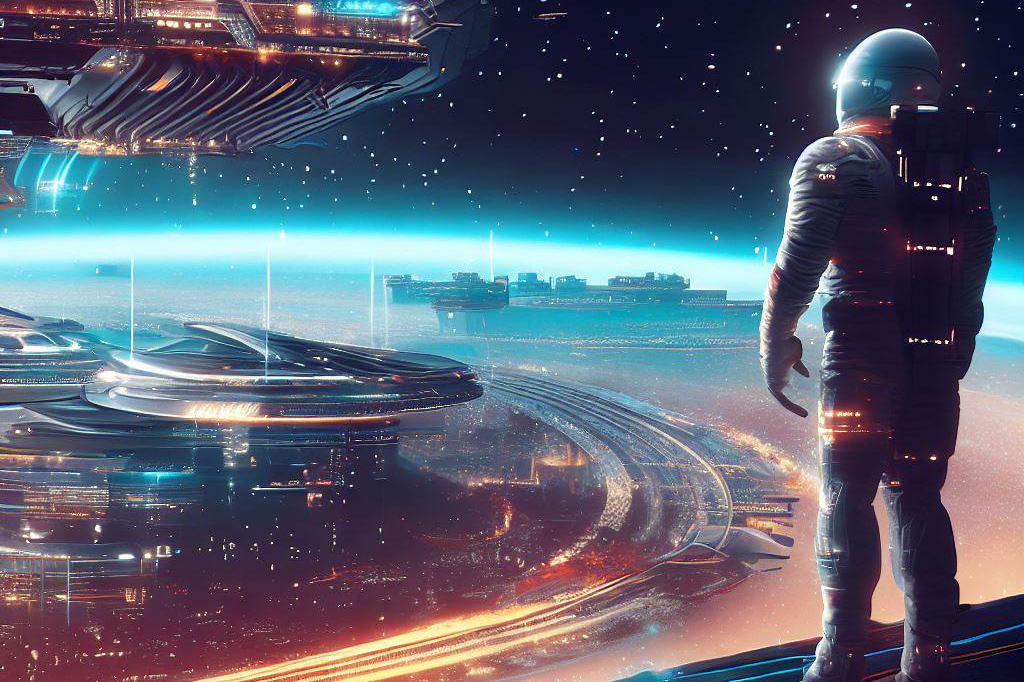
The Technological Hurdles of Space-Based Urbanization
Space-based urbanization requires overcoming numerous technological limitations. One of the most significant obstacles is developing sustainable life support systems for space habitats. This involves creating a self-sustaining environment that can provide the necessary resources to sustain human life, such as oxygen, water, and food.
It also means finding ways to manage waste and maintain safe living conditions within these habitats. Another technological hurdle is the transportation required for space-based urbanization.
Launching humans, materials, and equipment into orbit is an expensive and risky venture that requires advanced technology. Developing more efficient rocket engines or reusable spacecraft would help reduce costs, but it would require innovation beyond current capabilities.
The Legal Challenges of Space-Based Urbanization

The question of property rights in outer space poses legal challenges for space-based urbanization. The Outer Space Treaty of 1967 established that no nation could claim ownership over celestial bodies such as planets or moons.
However, it does not address private property rights in outer space or on asteroids. As commercial interests in space increase, legal frameworks must be established to govern resource allocation and ownership rights while avoiding conflicts between nations or corporations seeking to exploit celestial bodies.
Ethical Considerations for Space-Based Urbanization

Space-based urbanization also raises ethical issues, such as ensuring equitable access to resources in outer space. Accessing resources from other planets could provide a solution to resource scarcity on Earth, but it raises questions about who should have access to these resources.
Additionally, there are concerns about environmental sustainability when developing new habitats outside of Earth’s atmosphere. Careful consideration must be given to the impact of human activities on celestial bodies’ ecosystems before we begin exploiting them for economic gain.
While the potential economic and social benefits of space-based urbanization are vast, it is important to recognize the technological, legal, and ethical challenges that must be addressed before we can make it a reality. By working together and considering these issues, we can create a sustainable and equitable future for space exploration.
Final Thoughts

The potential for space-based urbanization and colonization to drive economic growth and social development is immense. With the continuous advancement of technology, space-based industries such as asteroid mining and space tourism are becoming more feasible.
There is also an opportunity for new markets to emerge as a result of space-based urbanization. This could create much-needed jobs and investment opportunities in a new industry.
Furthermore, space-based colonization has the potential to alleviate some of the problems we face on Earth, including overpopulation and resource scarcity. As we explore other planets and asteroids in our solar system, we could discover new resources that could help us sustain life on Earth or even contribute to scientific innovations that benefit all of humanity.
However, there are also challenges that need to be addressed before any significant progress can be made towards space-based urbanization and colonization. Technological limitations need to be overcome, such as developing sustainable life support systems that can withstand long-term habitation away from Earth.
Legal considerations such as property rights in outer space also need to be addressed, so that any exploration doesn’t result in exploitation or conflict over resources. Despite these challenges, it is important not to lose sight of the tremendous possibilities offered by pursuing these endeavors.
Through collaboration between governments, private industry stakeholders, and experts in various fields, there is no limit to what we can achieve. The future belongs to those who are willing to reach for it— let’s boldly go where no one has gone before!
TL;DR…
– 🚀 The potential of space-based urbanization and colonization for economic growth and social progress is being examined.
– 🌃 Space-based urbanization and colonization could provide benefits such as alleviating overpopulation on Earth and accessing resources from other planets or asteroids.
– 💼 Space-based industries like asteroid mining and space tourism have the potential to create new markets, goods, services, and supply chains.
– 🌍 Space-based urbanization and colonization present opportunities for scientific discovery, innovation, and job creation in a new industry.
– 🛰️ However, there are challenges to overcome, including technological hurdles, legal challenges, and ethical considerations in space-based urbanization.

C M, a seasoned editor, journalist, and consultant, is deeply fascinated by the convergence of technology, space, and the future of humanity.
With a particular interest in transhumanity, futurology, and the philosophical and ethical dimensions of these domains, C M serves as the lead contributor to SpaceSpotlight and TranscendSphere.
When not penning insightful articles on these rapidly evolving fields, C M indulges in their love for podcasts and books, proudly embracing their status as a ‘Happy Nerd Extraordinaire!’
